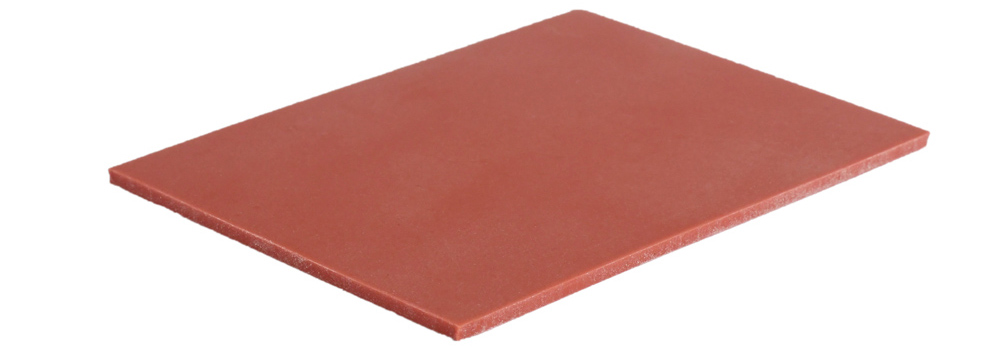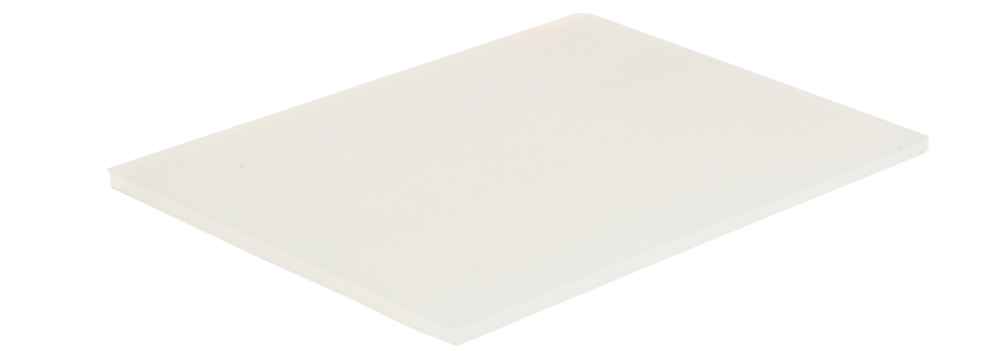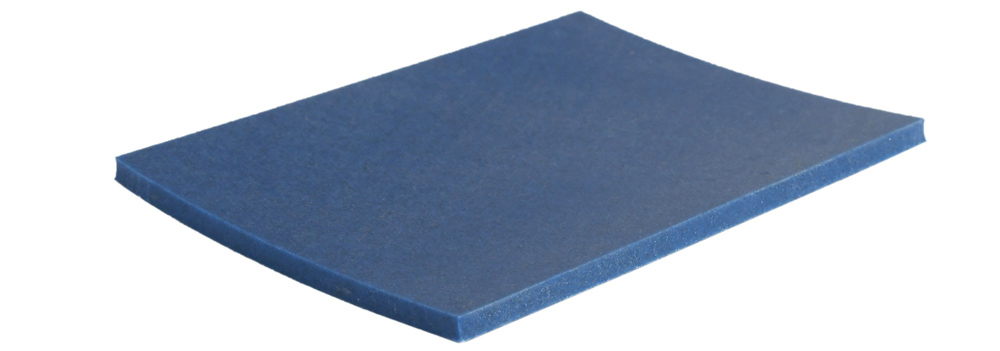Silicone seals
The basis of silicone is silicon atoms, which are linked to each other via oxygen atoms. Silicones represent a separate group of synthetic polymers. Due to their excellent mechanical and thermal properties as well as their biocompatibility, silicones are suitable as a sealing material for various applications. For this reason, with the help of our various manufacturing processes, we produce your individual flat gaskets made of silicone, e.g. for medical devices, for industrial applications, food plants and for use in the transport sector.



Available silicone materials at Rehm Dichtungen Ehlers GmbH
If high operating temperatures or foodstuff approvals are required, you can rely on our high-quality European silicone. In the area of foamed materials in combination with silicone components, we offer silicone foam.
Silicone qualities
Silicone 40 Shore transparent
Technical data sheet:
Properties:
| Hardness [Shore A] | ISO 7619-1 | 40 +-5 |
| Density [g/cm³] | ISO 1183 | Approx. 1.13 +- 0.05 |
| Tensile strength [N/mm²] | ISO 37-S2 | 23 |
| Elongation at break [%] | ISO 37-S2 | 625 |
Silicone 50 Shore transparent
Technical data sheet:
Properties:
| Hardness [Shore A] | ISO 7619-1 | 50 +-5 |
| Density [g/cm³] | ISO 1183 | Approx. 1.16 +- 0.05 |
| Tensile strength [N/mm²] | ISO 37-S2 | 18 |
| Elongation at break [%] | ISO 37-S2 | 450 |
Silicone 60 Shore blue metal detectable
Technical data sheet:
Silicone 60 Shore blue metal detectable
Properties:
| Hardness [Shore A] | ISO 7619-1 | 60 +-5 |
| Density [g/cm³] | ISO 1183 | Approx. 1.30 +- 0.05 |
| Tensile strength [N/mm²] | ISO 37-S2 | 21 |
| Elongation at break [%] | ISO 37-S2 | 370 |
Silicone 60 Shore transparent, red and blue
Technical data sheet:
Silicone 60 Shore transparent, red and blue
Properties:
| Hardness [Shore A] | ISO 7619-1 | 60 +-5 |
| Density [g/cm³] | ISO 1183 | Approx. 1.20 +- 0.05 |
| Tensile strength [N/mm²] | ISO 37-S2 | 22 |
| Elongation at break [%] | ISO 37-S2 | 400 |
The properties of silicone as a sealing material
Silicone is an excellent material for seals and gaskets. Silicone gaskets are characterized by both mechanical and thermal load capacities. As a rule, gaskets and other components are suitable for use in environments with a temperature range of between -60 °C and +210 °C. For this reason, flat gaskets made of silicone belong to the group of heat-resistant gaskets. In addition to good heat resistance and low-temperature flexibility, silicone gaskets also have good resistance to weathering and ozone, so that gaskets made of this material are also used in outdoor applications. In terms of mechanical properties, the low compression set and high tensile strength are particularly noteworthy. In addition, the material is a good electrical insulator. Furthermore, an application in thermal insulation is also possible, as the gasket material has very good thermal insulation properties.
The material is also relevant in the medical technology, food and pharmaceutical industries, as it is considered physiologically harmless and thus has various conformities, such as EC 1935/2004 or FDA (21 CFR 177-2600).
Our silicone has been tested and complies with the requirements of the American Food and Drugs Administration (FDA) 21 CFR 177-2600, BFR XV Recommendation and Directive EC 1935/2004. Based on FDA compliance, this ensures that our silicone flat gaskets do not lead to chemical contamination of food. The gasket material also has WRAS approval, which ensures contact with drinking water and thus enables use in beverage production.
Silicone seals are resistant to hot water, vegetable and animal fats as well as paraffinic mineral oils and alcohols. However, they are not resistant to vapours, aromatic mineral oils and fuels. Finally, it can be stated that the material is flame retardant but has a high gas permeability.
Especially in the food, drinking water or pharmaceutical industries, the risk of contamination of the end products with rubber seal particles is permanently present. There is a risk that abrasion or eroding particles of the silicone seal used will enter the production line and thus contaminate the end product. This can lead to high downtimes and consequently to high costs. To prevent these risks, the use of seals made of metal-detectable silicone is recommended. Metal-detectable silicone is characterized by the fact that it is manufactured with special additives, allowing metal detectors on the production line to identify the abrasions or rubber particles, and enabling rapid intervention in the production process in the event of potential contamination. Consequently, the use of flat gaskets made of metal-detectable silicone, through early detection of contamination, minimizes the risk of production downtime.
The metal-detectable gasket material has basically similar properties to our other silicone grades. Metal detectable silicone gaskets are temperature resistant in an application range between -60 °C to 230 °C. Furthermore, the gasket material is considered ozone and UV resistant. At the same time, gaskets made of this material are approved for use with potable water at temperatures up to 85 °C and also meet the flammability requirements of FAR25/JAR25/CS 25 Annex F, Part 1, (a)(1)(iv) and (a)(1)(v) and Automotive Standard Part 571FMVSS302. The blue coloration of the metal detectable silicone allows for quick recognition and high visibility in production.
The advantages and durability of silicone at a glance
Due to its high temperature resistance and good mechanical properties, silicone is an excellent material for seals and sealing profiles.
Silicone seals have excellent resistance to ozone, oxidation, ultraviolet light, cosmic and ionising radiation and weathering in general.
Silicone is:
- Biocompatible and physiologically harmless
- Temperature and heat resistant
- ozone and UV resistant
- food-safe
- FDA-compliant
- Approved for drinking water (according to WRAS)
Furthermore, seals or gaskets made of silicone are used where low-wear seals are required. The sealing material is also a good choice as an insulator in a weakly electrical environment, as it is dielectric - i.e. it does not transmit electricity.
The way to your silicone flat gasket
The silicone in our warehouse is subjected to quality control before being stored at the appropriate storage location. After passing the quality control, the silicone roll stock is stored. The quality control helps us to provide you with consistently perfect quality.
The gasket material silicone can be processed on any of our different manufacturing processes. This gives us a high degree of flexibility with regard to the production of your silicone flat gasket. The decisive decision-making criteria for selecting the most suitable process include the number of pieces, the dimensional accuracy, the respective contour, and the desired thickness of the gasket. In an upstream production step, we can apply a self-adhesive film to the roll material in advance. Subsequently, your self-adhesive silicone gasket is produced with the help of our manufacturing processes. It is important to note that self-adhesive gaskets are used exclusively for simplified assembly without changing the properties of the material. In addition to the manufactured flange and flat gaskets, you can also purchase unprocessed rolls and cut-to-size silicone yard goods for your own further processing.
Once production is complete, another quality check is performed before finally packing the seals and shipping them to you....
Areas of application for silicone seals
We can provide high quality solutions whether your application is in rail, aerospace, automotive and many other industries. High-quality flange and flat gaskets made of silicone are crucial for the long-lasting reliability of components in the food industry. Due to the positive physiological properties as well as the various approvals for contact with food, the use of silicone gaskets is ubiquitous in food plants and in the pharmaceutical industry. For this reason, we offer food-safe silicone seals which are also resistant to temperatures of up to 210° C as well as many common cleaning agents. In the production, processing and packaging of food, the detection of foreign bodies is a decisive factor in quality and safety. Consequently, the use of flat gaskets made of metal-detectable silicone is ideal here.
Silicone gaskets are also used in the construction and electronics industries. For example, flat gaskets made of this material are used in tunnel construction, façade construction and civil engineering. In particular, the positive weather resistance and temperature resistance justify this area of application. Finally, we are aware of the use of gaskets made of this material in the transport sector, since in the event of fire the gasket material should neither cause toxic gases nor be easily flammable. Both of these requirements are met by the material.
In summary, silicone gaskets offer high performance as well as long life at extreme temperatures and can therefore be used for sealing in industrial areas with unfavourable temperatures.
We will be happy to answer whether the material is also suitable for your purposes. Please contact our customer service, who will be happy to provide you with comprehensive advice.

